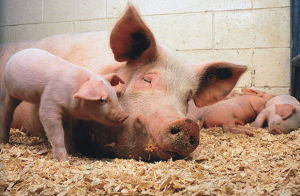WASHINGTON — A swine virus that has already caused a nationwide hog shortage has turned up in Arizona, where one farm official worries it could have “catastrophic effects on the pork buying and producing industry.”
Porcine epidemic diarrhea virus, or PEDV, was first discovered in the U.S. in the spring of 2013, according to the U.S. Department of Agriculture. The virus is harmless to humans, but the mortality rate for infected piglets has been at least 50 percent, the department said.
That will mean fewer hogs ready for market down the road, slimmer margins for farmers and, likely, higher prices for consumers, experts said.
“It’s devastating,” said Donna McReynolds, head of sales for McReynolds Farms in Phoenix, who said she’s “never seen a hog shortage like this.”
“We have to cancel orders and turn customers away simply because we don’t have enough hogs to fill them,” said McReynolds, who blames the shortage on the virus.
Agriculture Secretary Tom Vilsack said in a June news release that the virus is believed to have killed “some 7 million piglets” across the country in the last year, and that the number of market-ready hogs could drop as much as 10 percent this summer over last.
The virus was first discovered in Iowa in spring 2013. Since then, it has spread to an additional 29 states, with the first positive tests turning up in Arizona in January, according to the USDA.
The latest USDA testing report said there have been 28 tests of hogs of all ages in the state since January and that five of those came back positive. But two of three tests of suckling pigs in the state were positive and both tests of nursery pigs were positive.
Getting exact infection and mortality numbers is difficult because reporting the disease to the USDA has been voluntary for farmers, said Laura Oxley, an Arizona Department of Agriculture spokeswoman.
“It’s hard to say for sure how many (piglets) have died in the state,” she said. “It could be anywhere from one pig in the herd to all the pigs in the herd.”
John Anderson, deputy chief economist of the American Farm Bureau Federation, said farmers who were expecting a 2 percent increase in production have instead seen a 2 percent drop over the last six months.
“A 4 percent change may not seem like a lot,” he said, but in the “context of the meat industry it is huge deal.”
Anderson said farmers are looking for ways to compensate, including holding on to hogs that are ready for slaughter in an attempt “to fatten them up just a little bit more to try and make up for the losses.” But he noted that those few extra weeks of care can be costly for farmers, too.
Anderson’s main concern is that consumers will stop buying pork out of unfounded fear of the virus, hitting the industry even harder.
“We cannot stress enough that this virus cannot get people sick and pork is perfectly safe to eat,” he said.
Hogs are not nearly as big an Arizona commodity as cattle – which the USDA valued at $1.026 billion in January 2013 – but it was still worth $20.4 million in December 2012, the last date for which USDA numbers were available for Arizona hogs.
The USDA in June ordered that new cases of the virus be reported to federal or state agriculture officials, and Vilsack said the department will allocate $26.2 million to fight PEDV and another swine virus, porcine delta coronavirus.
Tom Miller, executive director of the Arizona Pork Council, said that because there is no vaccine available, farmers have to play a waiting game until the virus “runs its natural course.”
“Until then, we’ve just got to suck it up,” he said. “It will work its way out eventually, but until then all we can do is wait.”
© Copyright 2014, White Mountain Independent, Show Low, AZ.
